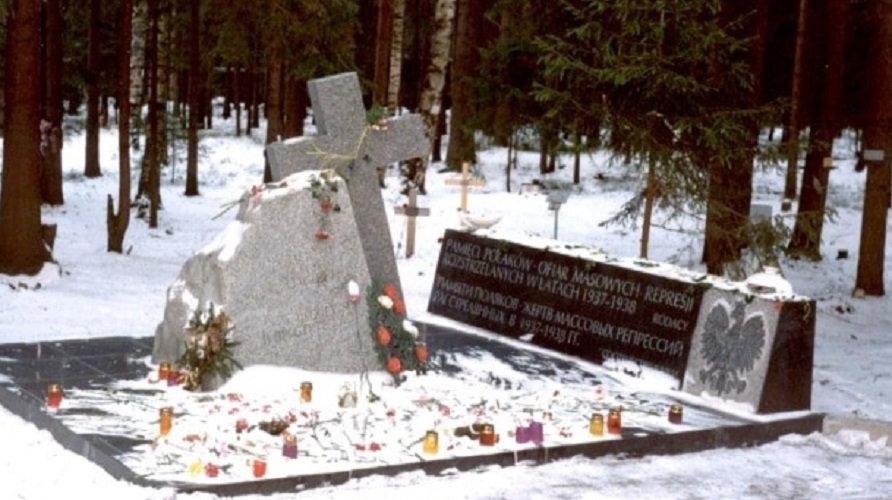The war of memory in Russia
Destroyed monuments and defaced gravestones: since the beginning of the invasion of Ukraine in the mass burial places of prisoners shot in the Soviet era or in the cemeteries of the concentration camps many symbols have started to be targeted. The cemetery in Levašovo, near St. Petersburg, where many Ukrainian and Polish victims of imprisonment on the Solovki Islands are buried also targeted.
Moscow (AsiaNews) - Following the invasion of Ukraine, the "cold war" of monuments, headstones and memorial stones has continued for months throughout the territory of the Russian Federation. In the last 35 years, starting from the last Gorbachev years, around two thousand monuments to the victims of political repression in the USSR had been installed in Russia. Most of them were the result of spontaneous initiatives by groups of citizens, in the places of mass burial of shot prisoners, or in concentration camp cemeteries.
Since the beginning of the war in Ukraine, many symbols and memorial objects have begun to disappear or be defaced, one after another. Most of them are those dedicated to Polish, Lithuanian and Ukrainian deportees in places of detention and confinement, in Siberia, in the northern regions or in those of concentration such as Mordova or Ingushetia.
Anonymous vandals tear the monuments to pieces, or tear off the lists of commemorated people, and the local authorities do not even open investigations into these facts. According to the Russian section of the BBC, at least 11 memorial complexes have been destroyed, and at least 15 others have been defaced, as confirmed by Irina Flige, director of the "Memorial" research center.
At the end of September this year in Yakutsk, in eastern Siberia, the monument to the deported Poles and Lithuanians, which had been installed in 2002, disappeared. Before the summer, access had been blocked with bars, so they were away are the tombstones and finally also the granite stones, the fundamental element of the complex.
The municipality had promised to shed light on what happened, but the department for the conservation of cultural heritage objects in the region concluded in recent days that it had no information on where everything could have ended up, and only a space remained on the site devastated, full of holes.
In March, another monument to Poles and Lithuanians was lost in Galjašor, in the northern region of Perm, a stele with a Latin cross under which a tablet reported the names of 89 deportees, placed near the cemetery with private funds.
The leak was discovered only in April, as it is in a difficult-to-access place in the woods, where it is almost impossible to reach before the spring thaw. Tatiana Margolina, member of the Human Rights Council of the Russian Presidency, declared that she "felt ashamed of this action, they used winter techniques by going behind the forest so as not to be seen". The police opened an investigation against unknown persons, to no avail.
A place very dear to the memory of repression is the Levašovo cemetery, near St. Petersburg, where many victims of the Solovki Islands concentration camp are buried. Here too, the tombstones of Ukrainians and Poles were defaced, although the entire area is a protected national park, but the monuments have no official status. Even earlier, in November 2022, three memorials to Poles were semi-destroyed in the Siberian region of Tomsk; November 11 was Poland's Independence Day, and the previous night the lists of Poles repressed under Stalin were removed.
In June this year, the graves of Poles deported to the Sverdlovsk region, in Siberia south of the Urals, were even desecrated. All the tombstones, installed by the victims' relatives, were smashed and thrown to the sides of the burial fields. In the cemetery of the village of Rečka Mišikha in Buryatia, the large cross above the chapel of the Polish victims was also sawn down.
Similar events were repeated in the Irkutsk and Vorkuta regions, in St. Petersburg and in other places. Instead, new monuments and memorial symbols appear dedicated to Soviet leaders, including Stalin himself, and also to Lenin, Kalinin, Dzerzhinsk (the founder of the Cheka-KGB), Sverdlov and other obscure figures from a returning past.
18/03/2022 09:43
17/02/2022 09:26
22/10/2021 11:20
29/10/2019 08:45
08/02/2018 10:48







.png)










